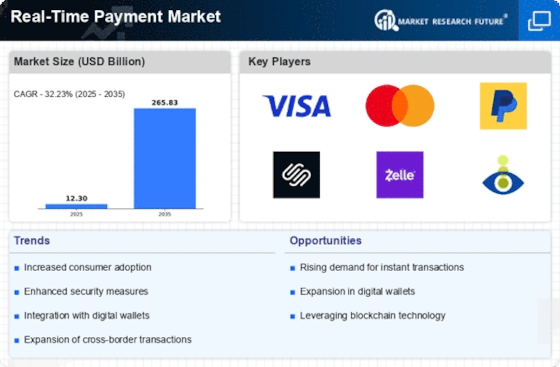-
EXECUTIVE SUMMARY
-
Market Overview
-
Key Findings
-
Market Segmentation
-
Competitive Landscape
-
Challenges and Opportunities
-
Future Outlook
-
MARKET INTRODUCTION
-
Definition
-
Scope of the study
- Research Objective
- Assumption
- Limitations
-
RESEARCH METHODOLOGY
-
Overview
-
Data Mining
-
Secondary Research
-
Primary Research
- Primary Interviews and Information Gathering Process
- Breakdown of Primary Respondents
-
Forecasting Model
-
Market Size Estimation
- Bottom-Up Approach
- Top-Down Approach
-
Data Triangulation
-
Validation
-
MARKET DYNAMICS
-
Overview
-
Drivers
-
Restraints
-
Opportunities
-
MARKET FACTOR ANALYSIS
-
Value chain Analysis
-
Porter's Five Forces Analysis
- Bargaining Power of Suppliers
- Bargaining Power of Buyers
- Threat of New Entrants
- Threat of Substitutes
- Intensity of Rivalry
-
COVID-19 Impact Analysis
- Market Impact Analysis
- Regional Impact
- Opportunity and Threat Analysis
-
Real Time Payment Market, BY TECHNOLOGY (USD BILLION)
-
Blockchain
-
Artificial Intelligence
-
Mobile Payment Solutions
-
Card Payment Systems
-
Real Time Payment Market, BY APPLICATION (USD BILLION)
-
Retail Payments
-
Business Payments
-
Peer-to-Peer Payments
-
Government Payments
-
Real Time Payment Market, BY END USE (USD BILLION)
-
Consumer
-
Businesses
-
Financial Institutions
-
Real Time Payment Market, BY PAYMENT MODE (USD BILLION)
-
Remote
-
In-Store
-
Online
-
Real Time Payment Market, BY REGIONAL (USD BILLION)
-
North America
- US
- Canada
-
Europe
- Germany
- UK
- France
- Russia
- Italy
- Spain
- Rest of Europe
-
APAC
- China
- India
- Japan
- South Korea
- Malaysia
- Thailand
- Indonesia
- Rest of APAC
-
South America
- Brazil
- Mexico
- Argentina
- Rest of South America
-
MEA
- GCC Countries
- South Africa
- Rest of MEA
-
COMPETITIVE LANDSCAPE
-
Overview
-
Competitive Analysis
-
Market share Analysis
-
Major Growth Strategy in the Real-Time Payment Market
-
Competitive Benchmarking
-
Leading Players in Terms of Number of Developments in the Real-Time Payment Market
-
Key developments and growth strategies
- New Product Launch/Service Deployment
- Merger & Acquisitions
- Joint Ventures
-
Major Players Financial Matrix
- Sales and Operating Income
- Major Players R&D Expenditure. 2023
-
COMPANY PROFILES
-
FIS
- Financial Overview
- Products Offered
- Key Developments
- SWOT Analysis
- Key Strategies
-
UnionPay
- Financial Overview
- Products Offered
- Key Developments
- SWOT Analysis
- Key Strategies
-
Alipay
- Financial Overview
- Products Offered
- Key Developments
- SWOT Analysis
- Key Strategies
-
PayPal
- Financial Overview
- Products Offered
- Key Developments
- SWOT Analysis
- Key Strategies
-
American Express
- Financial Overview
- Products Offered
- Key Developments
- SWOT Analysis
- Key Strategies
-
Worldline
- Financial Overview
- Products Offered
- Key Developments
- SWOT Analysis
- Key Strategies
-
WeChat Pay
- Financial Overview
- Products Offered
- Key Developments
- SWOT Analysis
- Key Strategies
-
Stripe
- Financial Overview
- Products Offered
- Key Developments
- SWOT Analysis
- Key Strategies
-
PayU
- Financial Overview
- Products Offered
- Key Developments
- SWOT Analysis
- Key Strategies
-
Adyen
- Financial Overview
- Products Offered
- Key Developments
- SWOT Analysis
- Key Strategies
-
Square
- Financial Overview
- Products Offered
- Key Developments
- SWOT Analysis
- Key Strategies
-
Visa
- Financial Overview
- Products Offered
- Key Developments
- SWOT Analysis
- Key Strategies
-
Mastercard
- Financial Overview
- Products Offered
- Key Developments
- SWOT Analysis
- Key Strategies
-
Nexi
- Financial Overview
- Products Offered
- Key Developments
- SWOT Analysis
- Key Strategies
-
Revolut
- Financial Overview
- Products Offered
- Key Developments
- SWOT Analysis
- Key Strategies
-
APPENDIX
-
References
-
Related Reports
-
LIST OF TABLES
-
LIST OF ASSUMPTIONS
-
NORTH AMERICA REAL-TIME PAYMENT MARKET SIZE ESTIMATES & Real Time Payment Market, BY TECHNOLOGY, 2019-2035 (USD BILLIONS)
-
NORTH AMERICA REAL-TIME PAYMENT MARKET SIZE ESTIMATES & Real Time Payment Market, BY APPLICATION, 2019-2035 (USD BILLIONS)
-
NORTH AMERICA REAL-TIME PAYMENT MARKET SIZE ESTIMATES & Real Time Payment Market, BY END USE, 2019-2035 (USD BILLIONS)
-
NORTH AMERICA REAL-TIME PAYMENT MARKET SIZE ESTIMATES & Real Time Payment Market, BY PAYMENT MODE, 2019-2035 (USD BILLIONS)
-
NORTH AMERICA REAL-TIME PAYMENT MARKET SIZE ESTIMATES & Real Time Payment Market, BY REGIONAL, 2019-2035 (USD BILLIONS)
-
US REAL-TIME PAYMENT MARKET SIZE ESTIMATES & Real Time Payment Market, BY TECHNOLOGY, 2019-2035 (USD BILLIONS)
-
US REAL-TIME PAYMENT MARKET SIZE ESTIMATES & Real Time Payment Market, BY APPLICATION, 2019-2035 (USD BILLIONS)
-
US REAL-TIME PAYMENT MARKET SIZE ESTIMATES & Real Time Payment Market, BY END USE, 2019-2035 (USD BILLIONS)
-
US REAL-TIME PAYMENT MARKET SIZE ESTIMATES & Real Time Payment Market, BY PAYMENT MODE, 2019-2035 (USD BILLIONS)
-
US REAL-TIME PAYMENT MARKET SIZE ESTIMATES & Real Time Payment Market, BY REGIONAL, 2019-2035 (USD BILLIONS)
-
CANADA REAL-TIME PAYMENT MARKET SIZE ESTIMATES & Real Time Payment Market, BY TECHNOLOGY, 2019-2035 (USD BILLIONS)
-
CANADA REAL-TIME PAYMENT MARKET SIZE ESTIMATES & Real Time Payment Market, BY APPLICATION, 2019-2035 (USD BILLIONS)
-
CANADA REAL-TIME PAYMENT MARKET SIZE ESTIMATES & Real Time Payment Market, BY END USE, 2019-2035 (USD BILLIONS)
-
CANADA REAL-TIME PAYMENT MARKET SIZE ESTIMATES & Real Time Payment Market, BY PAYMENT MODE, 2019-2035 (USD BILLIONS)
-
CANADA REAL-TIME PAYMENT MARKET SIZE ESTIMATES & Real Time Payment Market, BY REGIONAL, 2019-2035 (USD BILLIONS)
-
EUROPE REAL-TIME PAYMENT MARKET SIZE ESTIMATES & Real Time Payment Market, BY TECHNOLOGY, 2019-2035 (USD BILLIONS)
-
EUROPE REAL-TIME PAYMENT MARKET SIZE ESTIMATES & Real Time Payment Market, BY APPLICATION, 2019-2035 (USD BILLIONS)
-
EUROPE REAL-TIME PAYMENT MARKET SIZE ESTIMATES & Real Time Payment Market, BY END USE, 2019-2035 (USD BILLIONS)
-
EUROPE REAL-TIME PAYMENT MARKET SIZE ESTIMATES & Real Time Payment Market, BY PAYMENT MODE, 2019-2035 (USD BILLIONS)
-
EUROPE REAL-TIME PAYMENT MARKET SIZE ESTIMATES & Real Time Payment Market, BY REGIONAL, 2019-2035 (USD BILLIONS)
-
GERMANY REAL-TIME PAYMENT MARKET SIZE ESTIMATES & Real Time Payment Market, BY TECHNOLOGY, 2019-2035 (USD BILLIONS)
-
GERMANY REAL-TIME PAYMENT MARKET SIZE ESTIMATES & Real Time Payment Market, BY APPLICATION, 2019-2035 (USD BILLIONS)
-
GERMANY REAL-TIME PAYMENT MARKET SIZE ESTIMATES & Real Time Payment Market, BY END USE, 2019-2035 (USD BILLIONS)
-
GERMANY REAL-TIME PAYMENT MARKET SIZE ESTIMATES & Real Time Payment Market, BY PAYMENT MODE, 2019-2035 (USD BILLIONS)
-
GERMANY REAL-TIME PAYMENT MARKET SIZE ESTIMATES & Real Time Payment Market, BY REGIONAL, 2019-2035 (USD BILLIONS)
-
UK REAL-TIME PAYMENT MARKET SIZE ESTIMATES & Real Time Payment Market, BY TECHNOLOGY, 2019-2035 (USD BILLIONS)
-
UK REAL-TIME PAYMENT MARKET SIZE ESTIMATES & Real Time Payment Market, BY APPLICATION, 2019-2035 (USD BILLIONS)
-
UK REAL-TIME PAYMENT MARKET SIZE ESTIMATES & Real Time Payment Market, BY END USE, 2019-2035 (USD BILLIONS)
-
UK REAL-TIME PAYMENT MARKET SIZE ESTIMATES & Real Time Payment Market, BY PAYMENT MODE, 2019-2035 (USD BILLIONS)
-
UK REAL-TIME PAYMENT MARKET SIZE ESTIMATES & Real Time Payment Market, BY REGIONAL, 2019-2035 (USD BILLIONS)
-
FRANCE REAL-TIME PAYMENT MARKET SIZE ESTIMATES & Real Time Payment Market, BY TECHNOLOGY, 2019-2035 (USD BILLIONS)
-
FRANCE REAL-TIME PAYMENT MARKET SIZE ESTIMATES & Real Time Payment Market, BY APPLICATION, 2019-2035 (USD BILLIONS)
-
FRANCE REAL-TIME PAYMENT MARKET SIZE ESTIMATES & Real Time Payment Market, BY END USE, 2019-2035 (USD BILLIONS)
-
FRANCE REAL-TIME PAYMENT MARKET SIZE ESTIMATES & Real Time Payment Market, BY PAYMENT MODE, 2019-2035 (USD BILLIONS)
-
FRANCE REAL-TIME PAYMENT MARKET SIZE ESTIMATES & Real Time Payment Market, BY REGIONAL, 2019-2035 (USD BILLIONS)
-
RUSSIA REAL-TIME PAYMENT MARKET SIZE ESTIMATES & Real Time Payment Market, BY TECHNOLOGY, 2019-2035 (USD BILLIONS)
-
RUSSIA REAL-TIME PAYMENT MARKET SIZE ESTIMATES & Real Time Payment Market, BY APPLICATION, 2019-2035 (USD BILLIONS)
-
RUSSIA REAL-TIME PAYMENT MARKET SIZE ESTIMATES & Real Time Payment Market, BY END USE, 2019-2035 (USD BILLIONS)
-
RUSSIA REAL-TIME PAYMENT MARKET SIZE ESTIMATES & Real Time Payment Market, BY PAYMENT MODE, 2019-2035 (USD BILLIONS)
-
RUSSIA REAL-TIME PAYMENT MARKET SIZE ESTIMATES & Real Time Payment Market, BY REGIONAL, 2019-2035 (USD BILLIONS)
-
ITALY REAL-TIME PAYMENT MARKET SIZE ESTIMATES & Real Time Payment Market, BY TECHNOLOGY, 2019-2035 (USD BILLIONS)
-
ITALY REAL-TIME PAYMENT MARKET SIZE ESTIMATES & Real Time Payment Market, BY APPLICATION, 2019-2035 (USD BILLIONS)
-
ITALY REAL-TIME PAYMENT MARKET SIZE ESTIMATES & Real Time Payment Market, BY END USE, 2019-2035 (USD BILLIONS)
-
ITALY REAL-TIME PAYMENT MARKET SIZE ESTIMATES & Real Time Payment Market, BY PAYMENT MODE, 2019-2035 (USD BILLIONS)
-
ITALY REAL-TIME PAYMENT MARKET SIZE ESTIMATES & Real Time Payment Market, BY REGIONAL, 2019-2035 (USD BILLIONS)
-
SPAIN REAL-TIME PAYMENT MARKET SIZE ESTIMATES & Real Time Payment Market, BY TECHNOLOGY, 2019-2035 (USD BILLIONS)
-
SPAIN REAL-TIME PAYMENT MARKET SIZE ESTIMATES & Real Time Payment Market, BY APPLICATION, 2019-2035 (USD BILLIONS)
-
SPAIN REAL-TIME PAYMENT MARKET SIZE ESTIMATES & Real Time Payment Market, BY END USE, 2019-2035 (USD BILLIONS)
-
SPAIN REAL-TIME PAYMENT MARKET SIZE ESTIMATES & Real Time Payment Market, BY PAYMENT MODE, 2019-2035 (USD BILLIONS)
-
SPAIN REAL-TIME PAYMENT MARKET SIZE ESTIMATES & Real Time Payment Market, BY REGIONAL, 2019-2035 (USD BILLIONS)
-
REST OF EUROPE REAL-TIME PAYMENT MARKET SIZE ESTIMATES & Real Time Payment Market, BY TECHNOLOGY, 2019-2035 (USD BILLIONS)
-
REST OF EUROPE REAL-TIME PAYMENT MARKET SIZE ESTIMATES & Real Time Payment Market, BY APPLICATION, 2019-2035 (USD BILLIONS)
-
REST OF EUROPE REAL-TIME PAYMENT MARKET SIZE ESTIMATES & Real Time Payment Market, BY END USE, 2019-2035 (USD BILLIONS)
-
REST OF EUROPE REAL-TIME PAYMENT MARKET SIZE ESTIMATES & Real Time Payment Market, BY PAYMENT MODE, 2019-2035 (USD BILLIONS)
-
REST OF EUROPE REAL-TIME PAYMENT MARKET SIZE ESTIMATES & Real Time Payment Market, BY REGIONAL, 2019-2035 (USD BILLIONS)
-
APAC REAL-TIME PAYMENT MARKET SIZE ESTIMATES & Real Time Payment Market, BY TECHNOLOGY, 2019-2035 (USD BILLIONS)
-
APAC REAL-TIME PAYMENT MARKET SIZE ESTIMATES & Real Time Payment Market, BY APPLICATION, 2019-2035 (USD BILLIONS)
-
APAC REAL-TIME PAYMENT MARKET SIZE ESTIMATES & Real Time Payment Market, BY END USE, 2019-2035 (USD BILLIONS)
-
APAC REAL-TIME PAYMENT MARKET SIZE ESTIMATES & Real Time Payment Market, BY PAYMENT MODE, 2019-2035 (USD BILLIONS)
-
APAC REAL-TIME PAYMENT MARKET SIZE ESTIMATES & Real Time Payment Market, BY REGIONAL, 2019-2035 (USD BILLIONS)
-
CHINA REAL-TIME PAYMENT MARKET SIZE ESTIMATES & Real Time Payment Market, BY TECHNOLOGY, 2019-2035 (USD BILLIONS)
-
CHINA REAL-TIME PAYMENT MARKET SIZE ESTIMATES & Real Time Payment Market, BY APPLICATION, 2019-2035 (USD BILLIONS)
-
CHINA REAL-TIME PAYMENT MARKET SIZE ESTIMATES & Real Time Payment Market, BY END USE, 2019-2035 (USD BILLIONS)
-
CHINA REAL-TIME PAYMENT MARKET SIZE ESTIMATES & Real Time Payment Market, BY PAYMENT MODE, 2019-2035 (USD BILLIONS)
-
CHINA REAL-TIME PAYMENT MARKET SIZE ESTIMATES & Real Time Payment Market, BY REGIONAL, 2019-2035 (USD BILLIONS)
-
INDIA REAL-TIME PAYMENT MARKET SIZE ESTIMATES & Real Time Payment Market, BY TECHNOLOGY, 2019-2035 (USD BILLIONS)
-
INDIA REAL-TIME PAYMENT MARKET SIZE ESTIMATES & Real Time Payment Market, BY APPLICATION, 2019-2035 (USD BILLIONS)
-
INDIA REAL-TIME PAYMENT MARKET SIZE ESTIMATES & Real Time Payment Market, BY END USE, 2019-2035 (USD BILLIONS)
-
INDIA REAL-TIME PAYMENT MARKET SIZE ESTIMATES & Real Time Payment Market, BY PAYMENT MODE, 2019-2035 (USD BILLIONS)
-
INDIA REAL-TIME PAYMENT MARKET SIZE ESTIMATES & Real Time Payment Market, BY REGIONAL, 2019-2035 (USD BILLIONS)
-
JAPAN REAL-TIME PAYMENT MARKET SIZE ESTIMATES & Real Time Payment Market, BY TECHNOLOGY, 2019-2035 (USD BILLIONS)
-
JAPAN REAL-TIME PAYMENT MARKET SIZE ESTIMATES & Real Time Payment Market, BY APPLICATION, 2019-2035 (USD BILLIONS)
-
JAPAN REAL-TIME PAYMENT MARKET SIZE ESTIMATES & Real Time Payment Market, BY END USE, 2019-2035 (USD BILLIONS)
-
JAPAN REAL-TIME PAYMENT MARKET SIZE ESTIMATES & Real Time Payment Market, BY PAYMENT MODE, 2019-2035 (USD BILLIONS)
-
JAPAN REAL-TIME PAYMENT MARKET SIZE ESTIMATES & Real Time Payment Market, BY REGIONAL, 2019-2035 (USD BILLIONS)
-
SOUTH KOREA REAL-TIME PAYMENT MARKET SIZE ESTIMATES & Real Time Payment Market, BY TECHNOLOGY, 2019-2035 (USD BILLIONS)
-
SOUTH KOREA REAL-TIME PAYMENT MARKET SIZE ESTIMATES & Real Time Payment Market, BY APPLICATION, 2019-2035 (USD BILLIONS)
-
SOUTH KOREA REAL-TIME PAYMENT MARKET SIZE ESTIMATES & Real Time Payment Market, BY END USE, 2019-2035 (USD BILLIONS)
-
SOUTH KOREA REAL-TIME PAYMENT MARKET SIZE ESTIMATES & Real Time Payment Market, BY PAYMENT MODE, 2019-2035 (USD BILLIONS)
-
SOUTH KOREA REAL-TIME PAYMENT MARKET SIZE ESTIMATES & Real Time Payment Market, BY REGIONAL, 2019-2035 (USD BILLIONS)
-
MALAYSIA REAL-TIME PAYMENT MARKET SIZE ESTIMATES & Real Time Payment Market, BY TECHNOLOGY, 2019-2035 (USD BILLIONS)
-
MALAYSIA REAL-TIME PAYMENT MARKET SIZE ESTIMATES & Real Time Payment Market, BY APPLICATION, 2019-2035 (USD BILLIONS)
-
MALAYSIA REAL-TIME PAYMENT MARKET SIZE ESTIMATES & Real Time Payment Market, BY END USE, 2019-2035 (USD BILLIONS)
-
MALAYSIA REAL-TIME PAYMENT MARKET SIZE ESTIMATES & Real Time Payment Market, BY PAYMENT MODE, 2019-2035 (USD BILLIONS)
-
MALAYSIA REAL-TIME PAYMENT MARKET SIZE ESTIMATES & Real Time Payment Market, BY REGIONAL, 2019-2035 (USD BILLIONS)
-
THAILAND REAL-TIME PAYMENT MARKET SIZE ESTIMATES & Real Time Payment Market, BY TECHNOLOGY, 2019-2035 (USD BILLIONS)
-
THAILAND REAL-TIME PAYMENT MARKET SIZE ESTIMATES & Real Time Payment Market, BY APPLICATION, 2019-2035 (USD BILLIONS)
-
THAILAND REAL-TIME PAYMENT MARKET SIZE ESTIMATES & Real Time Payment Market, BY END USE, 2019-2035 (USD BILLIONS)
-
THAILAND REAL-TIME PAYMENT MARKET SIZE ESTIMATES & Real Time Payment Market, BY PAYMENT MODE, 2019-2035 (USD BILLIONS)
-
THAILAND REAL-TIME PAYMENT MARKET SIZE ESTIMATES & Real Time Payment Market, BY REGIONAL, 2019-2035 (USD BILLIONS)
-
INDONESIA REAL-TIME PAYMENT MARKET SIZE ESTIMATES & Real Time Payment Market, BY TECHNOLOGY, 2019-2035 (USD BILLIONS)
-
INDONESIA REAL-TIME PAYMENT MARKET SIZE ESTIMATES & Real Time Payment Market, BY APPLICATION, 2019-2035 (USD BILLIONS)
-
INDONESIA REAL-TIME PAYMENT MARKET SIZE ESTIMATES & Real Time Payment Market, BY END USE, 2019-2035 (USD BILLIONS)
-
INDONESIA REAL-TIME PAYMENT MARKET SIZE ESTIMATES & Real Time Payment Market, BY PAYMENT MODE, 2019-2035 (USD BILLIONS)
-
INDONESIA REAL-TIME PAYMENT MARKET SIZE ESTIMATES & Real Time Payment Market, BY REGIONAL, 2019-2035 (USD BILLIONS)
-
REST OF APAC REAL-TIME PAYMENT MARKET SIZE ESTIMATES & Real Time Payment Market, BY TECHNOLOGY, 2019-2035 (USD BILLIONS)
-
REST OF APAC REAL-TIME PAYMENT MARKET SIZE ESTIMATES & Real Time Payment Market, BY APPLICATION, 2019-2035 (USD BILLIONS)
-
REST OF APAC REAL-TIME PAYMENT MARKET SIZE ESTIMATES & Real Time Payment Market, BY END USE, 2019-2035 (USD BILLIONS)
-
REST OF APAC REAL-TIME PAYMENT MARKET SIZE ESTIMATES & Real Time Payment Market, BY PAYMENT MODE, 2019-2035 (USD BILLIONS)
-
REST OF APAC REAL-TIME PAYMENT MARKET SIZE ESTIMATES & Real Time Payment Market, BY REGIONAL, 2019-2035 (USD BILLIONS)
-
SOUTH AMERICA REAL-TIME PAYMENT MARKET SIZE ESTIMATES & Real Time Payment Market, BY TECHNOLOGY, 2019-2035 (USD BILLIONS)
-
SOUTH AMERICA REAL-TIME PAYMENT MARKET SIZE ESTIMATES & Real Time Payment Market, BY APPLICATION, 2019-2035 (USD BILLIONS)
-
SOUTH AMERICA REAL-TIME PAYMENT MARKET SIZE ESTIMATES & Real Time Payment Market, BY END USE, 2019-2035 (USD BILLIONS)
-
SOUTH AMERICA REAL-TIME PAYMENT MARKET SIZE ESTIMATES & Real Time Payment Market, BY PAYMENT MODE, 2019-2035 (USD BILLIONS)
-
SOUTH AMERICA REAL-TIME PAYMENT MARKET SIZE ESTIMATES & Real Time Payment Market, BY REGIONAL, 2019-2035 (USD BILLIONS)
-
BRAZIL REAL-TIME PAYMENT MARKET SIZE ESTIMATES & Real Time Payment Market, BY TECHNOLOGY, 2019-2035 (USD BILLIONS)
-
BRAZIL REAL-TIME PAYMENT MARKET SIZE ESTIMATES & Real Time Payment Market, BY APPLICATION, 2019-2035 (USD BILLIONS)
-
BRAZIL REAL-TIME PAYMENT MARKET SIZE ESTIMATES & Real Time Payment Market, BY END USE, 2019-2035 (USD BILLIONS)
-
BRAZIL REAL-TIME PAYMENT MARKET SIZE ESTIMATES & Real Time Payment Market, BY PAYMENT MODE, 2019-2035 (USD BILLIONS)
-
BRAZIL REAL-TIME PAYMENT MARKET SIZE ESTIMATES & Real Time Payment Market, BY REGIONAL, 2019-2035 (USD BILLIONS)
-
MEXICO REAL-TIME PAYMENT MARKET SIZE ESTIMATES & Real Time Payment Market, BY TECHNOLOGY, 2019-2035 (USD BILLIONS)
-
MEXICO REAL-TIME PAYMENT MARKET SIZE ESTIMATES & Real Time Payment Market, BY APPLICATION, 2019-2035 (USD BILLIONS)
-
MEXICO REAL-TIME PAYMENT MARKET SIZE ESTIMATES & Real Time Payment Market, BY END USE, 2019-2035 (USD BILLIONS)
-
MEXICO REAL-TIME PAYMENT MARKET SIZE ESTIMATES & Real Time Payment Market, BY PAYMENT MODE, 2019-2035 (USD BILLIONS)
-
MEXICO REAL-TIME PAYMENT MARKET SIZE ESTIMATES & Real Time Payment Market, BY REGIONAL, 2019-2035 (USD BILLIONS)
-
ARGENTINA REAL-TIME PAYMENT MARKET SIZE ESTIMATES & Real Time Payment Market, BY TECHNOLOGY, 2019-2035 (USD BILLIONS)
-
ARGENTINA REAL-TIME PAYMENT MARKET SIZE ESTIMATES & Real Time Payment Market, BY APPLICATION, 2019-2035 (USD BILLIONS)
-
ARGENTINA REAL-TIME PAYMENT MARKET SIZE ESTIMATES & Real Time Payment Market, BY END USE, 2019-2035 (USD BILLIONS)
-
ARGENTINA REAL-TIME PAYMENT MARKET SIZE ESTIMATES & Real Time Payment Market, BY PAYMENT MODE, 2019-2035 (USD BILLIONS)
-
ARGENTINA REAL-TIME PAYMENT MARKET SIZE ESTIMATES & Real Time Payment Market, BY REGIONAL, 2019-2035 (USD BILLIONS)
-
REST OF SOUTH AMERICA REAL-TIME PAYMENT MARKET SIZE ESTIMATES & Real Time Payment Market, BY TECHNOLOGY, 2019-2035 (USD BILLIONS)
-
REST OF SOUTH AMERICA REAL-TIME PAYMENT MARKET SIZE ESTIMATES & Real Time Payment Market, BY APPLICATION, 2019-2035 (USD BILLIONS)
-
REST OF SOUTH AMERICA REAL-TIME PAYMENT MARKET SIZE ESTIMATES & Real Time Payment Market, BY END USE, 2019-2035 (USD BILLIONS)
-
REST OF SOUTH AMERICA REAL-TIME PAYMENT MARKET SIZE ESTIMATES & Real Time Payment Market, BY PAYMENT MODE, 2019-2035 (USD BILLIONS)
-
REST OF SOUTH AMERICA REAL-TIME PAYMENT MARKET SIZE ESTIMATES & Real Time Payment Market, BY REGIONAL, 2019-2035 (USD BILLIONS)
-
MEA REAL-TIME PAYMENT MARKET SIZE ESTIMATES & Real Time Payment Market, BY TECHNOLOGY, 2019-2035 (USD BILLIONS)
-
MEA REAL-TIME PAYMENT MARKET SIZE ESTIMATES & Real Time Payment Market, BY APPLICATION, 2019-2035 (USD BILLIONS)
-
MEA REAL-TIME PAYMENT MARKET SIZE ESTIMATES & Real Time Payment Market, BY END USE, 2019-2035 (USD BILLIONS)
-
MEA REAL-TIME PAYMENT MARKET SIZE ESTIMATES & Real Time Payment Market, BY PAYMENT MODE, 2019-2035 (USD BILLIONS)
-
MEA REAL-TIME PAYMENT MARKET SIZE ESTIMATES & Real Time Payment Market, BY REGIONAL, 2019-2035 (USD BILLIONS)
-
GCC COUNTRIES REAL-TIME PAYMENT MARKET SIZE ESTIMATES & Real Time Payment Market, BY TECHNOLOGY, 2019-2035 (USD BILLIONS)
-
GCC COUNTRIES REAL-TIME PAYMENT MARKET SIZE ESTIMATES & Real Time Payment Market, BY APPLICATION, 2019-2035 (USD BILLIONS)
-
GCC COUNTRIES REAL-TIME PAYMENT MARKET SIZE ESTIMATES & Real Time Payment Market, BY END USE, 2019-2035 (USD BILLIONS)
-
GCC COUNTRIES REAL-TIME PAYMENT MARKET SIZE ESTIMATES & Real Time Payment Market, BY PAYMENT MODE, 2019-2035 (USD BILLIONS)
-
GCC COUNTRIES REAL-TIME PAYMENT MARKET SIZE ESTIMATES & Real Time Payment Market, BY REGIONAL, 2019-2035 (USD BILLIONS)
-
SOUTH AFRICA REAL-TIME PAYMENT MARKET SIZE ESTIMATES & Real Time Payment Market, BY TECHNOLOGY, 2019-2035 (USD BILLIONS)
-
SOUTH AFRICA REAL-TIME PAYMENT MARKET SIZE ESTIMATES & Real Time Payment Market, BY APPLICATION, 2019-2035 (USD BILLIONS)
-
SOUTH AFRICA REAL-TIME PAYMENT MARKET SIZE ESTIMATES & Real Time Payment Market, BY END USE, 2019-2035 (USD BILLIONS)
-
SOUTH AFRICA REAL-TIME PAYMENT MARKET SIZE ESTIMATES & Real Time Payment Market, BY PAYMENT MODE, 2019-2035 (USD BILLIONS)
-
SOUTH AFRICA REAL-TIME PAYMENT MARKET SIZE ESTIMATES & Real Time Payment Market, BY REGIONAL, 2019-2035 (USD BILLIONS)
-
REST OF MEA REAL-TIME PAYMENT MARKET SIZE ESTIMATES & Real Time Payment Market, BY TECHNOLOGY, 2019-2035 (USD BILLIONS)
-
REST OF MEA REAL-TIME PAYMENT MARKET SIZE ESTIMATES & Real Time Payment Market, BY APPLICATION, 2019-2035 (USD BILLIONS)
-
REST OF MEA REAL-TIME PAYMENT MARKET SIZE ESTIMATES & Real Time Payment Market, BY END USE, 2019-2035 (USD BILLIONS)
-
REST OF MEA REAL-TIME PAYMENT MARKET SIZE ESTIMATES & Real Time Payment Market, BY PAYMENT MODE, 2019-2035 (USD BILLIONS)
-
REST OF MEA REAL-TIME PAYMENT MARKET SIZE ESTIMATES & Real Time Payment Market, BY REGIONAL, 2019-2035 (USD BILLIONS)
-
PRODUCT LAUNCH/PRODUCT DEVELOPMENT/APPROVAL
-
ACQUISITION/PARTNERSHIP
-
LIST OF FIGURES
-
MARKET SYNOPSIS
-
NORTH AMERICA REAL-TIME PAYMENT MARKET ANALYSIS
-
US REAL-TIME PAYMENT MARKET ANALYSIS BY TECHNOLOGY
-
US REAL-TIME PAYMENT MARKET ANALYSIS BY APPLICATION
-
US REAL-TIME PAYMENT MARKET ANALYSIS BY END USE
-
US REAL-TIME PAYMENT MARKET ANALYSIS BY PAYMENT MODE
-
US REAL-TIME PAYMENT MARKET ANALYSIS BY REGIONAL
-
CANADA REAL-TIME PAYMENT MARKET ANALYSIS BY TECHNOLOGY
-
CANADA REAL-TIME PAYMENT MARKET ANALYSIS BY APPLICATION
-
CANADA REAL-TIME PAYMENT MARKET ANALYSIS BY END USE
-
CANADA REAL-TIME PAYMENT MARKET ANALYSIS BY PAYMENT MODE
-
CANADA REAL-TIME PAYMENT MARKET ANALYSIS BY REGIONAL
-
EUROPE REAL-TIME PAYMENT MARKET ANALYSIS
-
GERMANY REAL-TIME PAYMENT MARKET ANALYSIS BY TECHNOLOGY
-
GERMANY REAL-TIME PAYMENT MARKET ANALYSIS BY APPLICATION
-
GERMANY REAL-TIME PAYMENT MARKET ANALYSIS BY END USE
-
GERMANY REAL-TIME PAYMENT MARKET ANALYSIS BY PAYMENT MODE
-
GERMANY REAL-TIME PAYMENT MARKET ANALYSIS BY REGIONAL
-
UK REAL-TIME PAYMENT MARKET ANALYSIS BY TECHNOLOGY
-
UK REAL-TIME PAYMENT MARKET ANALYSIS BY APPLICATION
-
UK REAL-TIME PAYMENT MARKET ANALYSIS BY END USE
-
UK REAL-TIME PAYMENT MARKET ANALYSIS BY PAYMENT MODE
-
UK REAL-TIME PAYMENT MARKET ANALYSIS BY REGIONAL
-
FRANCE REAL-TIME PAYMENT MARKET ANALYSIS BY TECHNOLOGY
-
FRANCE REAL-TIME PAYMENT MARKET ANALYSIS BY APPLICATION
-
FRANCE REAL-TIME PAYMENT MARKET ANALYSIS BY END USE
-
FRANCE REAL-TIME PAYMENT MARKET ANALYSIS BY PAYMENT MODE
-
FRANCE REAL-TIME PAYMENT MARKET ANALYSIS BY REGIONAL
-
RUSSIA REAL-TIME PAYMENT MARKET ANALYSIS BY TECHNOLOGY
-
RUSSIA REAL-TIME PAYMENT MARKET ANALYSIS BY APPLICATION
-
RUSSIA REAL-TIME PAYMENT MARKET ANALYSIS BY END USE
-
RUSSIA REAL-TIME PAYMENT MARKET ANALYSIS BY PAYMENT MODE
-
RUSSIA REAL-TIME PAYMENT MARKET ANALYSIS BY REGIONAL
-
ITALY REAL-TIME PAYMENT MARKET ANALYSIS BY TECHNOLOGY
-
ITALY REAL-TIME PAYMENT MARKET ANALYSIS BY APPLICATION
-
ITALY REAL-TIME PAYMENT MARKET ANALYSIS BY END USE
-
ITALY REAL-TIME PAYMENT MARKET ANALYSIS BY PAYMENT MODE
-
ITALY REAL-TIME PAYMENT MARKET ANALYSIS BY REGIONAL
-
SPAIN REAL-TIME PAYMENT MARKET ANALYSIS BY TECHNOLOGY
-
SPAIN REAL-TIME PAYMENT MARKET ANALYSIS BY APPLICATION
-
SPAIN REAL-TIME PAYMENT MARKET ANALYSIS BY END USE
-
SPAIN REAL-TIME PAYMENT MARKET ANALYSIS BY PAYMENT MODE
-
SPAIN REAL-TIME PAYMENT MARKET ANALYSIS BY REGIONAL
-
REST OF EUROPE REAL-TIME PAYMENT MARKET ANALYSIS BY TECHNOLOGY
-
REST OF EUROPE REAL-TIME PAYMENT MARKET ANALYSIS BY APPLICATION
-
REST OF EUROPE REAL-TIME PAYMENT MARKET ANALYSIS BY END USE
-
REST OF EUROPE REAL-TIME PAYMENT MARKET ANALYSIS BY PAYMENT MODE
-
REST OF EUROPE REAL-TIME PAYMENT MARKET ANALYSIS BY REGIONAL
-
APAC REAL-TIME PAYMENT MARKET ANALYSIS
-
CHINA REAL-TIME PAYMENT MARKET ANALYSIS BY TECHNOLOGY
-
CHINA REAL-TIME PAYMENT MARKET ANALYSIS BY APPLICATION
-
CHINA REAL-TIME PAYMENT MARKET ANALYSIS BY END USE
-
CHINA REAL-TIME PAYMENT MARKET ANALYSIS BY PAYMENT MODE
-
CHINA REAL-TIME PAYMENT MARKET ANALYSIS BY REGIONAL
-
INDIA REAL-TIME PAYMENT MARKET ANALYSIS BY TECHNOLOGY
-
INDIA REAL-TIME PAYMENT MARKET ANALYSIS BY APPLICATION
-
INDIA REAL-TIME PAYMENT MARKET ANALYSIS BY END USE
-
INDIA REAL-TIME PAYMENT MARKET ANALYSIS BY PAYMENT MODE
-
INDIA REAL-TIME PAYMENT MARKET ANALYSIS BY REGIONAL
-
JAPAN REAL-TIME PAYMENT MARKET ANALYSIS BY TECHNOLOGY
-
JAPAN REAL-TIME PAYMENT MARKET ANALYSIS BY APPLICATION
-
JAPAN REAL-TIME PAYMENT MARKET ANALYSIS BY END USE
-
JAPAN REAL-TIME PAYMENT MARKET ANALYSIS BY PAYMENT MODE
-
JAPAN REAL-TIME PAYMENT MARKET ANALYSIS BY REGIONAL
-
SOUTH KOREA REAL-TIME PAYMENT MARKET ANALYSIS BY TECHNOLOGY
-
SOUTH KOREA REAL-TIME PAYMENT MARKET ANALYSIS BY APPLICATION
-
SOUTH KOREA REAL-TIME PAYMENT MARKET ANALYSIS BY END USE
-
SOUTH KOREA REAL-TIME PAYMENT MARKET ANALYSIS BY PAYMENT MODE
-
SOUTH KOREA REAL-TIME PAYMENT MARKET ANALYSIS BY REGIONAL
-
MALAYSIA REAL-TIME PAYMENT MARKET ANALYSIS BY TECHNOLOGY
-
MALAYSIA REAL-TIME PAYMENT MARKET ANALYSIS BY APPLICATION
-
MALAYSIA REAL-TIME PAYMENT MARKET ANALYSIS BY END USE
-
MALAYSIA REAL-TIME PAYMENT MARKET ANALYSIS BY PAYMENT MODE
-
MALAYSIA REAL-TIME PAYMENT MARKET ANALYSIS BY REGIONAL
-
THAILAND REAL-TIME PAYMENT MARKET ANALYSIS BY TECHNOLOGY
-
THAILAND REAL-TIME PAYMENT MARKET ANALYSIS BY APPLICATION
-
THAILAND REAL-TIME PAYMENT MARKET ANALYSIS BY END USE
-
THAILAND REAL-TIME PAYMENT MARKET ANALYSIS BY PAYMENT MODE
-
THAILAND REAL-TIME PAYMENT MARKET ANALYSIS BY REGIONAL
-
INDONESIA REAL-TIME PAYMENT MARKET ANALYSIS BY TECHNOLOGY
-
INDONESIA REAL-TIME PAYMENT MARKET ANALYSIS BY APPLICATION
-
INDONESIA REAL-TIME PAYMENT MARKET ANALYSIS BY END USE
-
INDONESIA REAL-TIME PAYMENT MARKET ANALYSIS BY PAYMENT MODE
-
INDONESIA REAL-TIME PAYMENT MARKET ANALYSIS BY REGIONAL
-
REST OF APAC REAL-TIME PAYMENT MARKET ANALYSIS BY TECHNOLOGY
-
REST OF APAC REAL-TIME PAYMENT MARKET ANALYSIS BY APPLICATION
-
REST OF APAC REAL-TIME PAYMENT MARKET ANALYSIS BY END USE
-
REST OF APAC REAL-TIME PAYMENT MARKET ANALYSIS BY PAYMENT MODE
-
REST OF APAC REAL-TIME PAYMENT MARKET ANALYSIS BY REGIONAL
-
SOUTH AMERICA REAL-TIME PAYMENT MARKET ANALYSIS
-
BRAZIL REAL-TIME PAYMENT MARKET ANALYSIS BY TECHNOLOGY
-
BRAZIL REAL-TIME PAYMENT MARKET ANALYSIS BY APPLICATION
-
BRAZIL REAL-TIME PAYMENT MARKET ANALYSIS BY END USE
-
BRAZIL REAL-TIME PAYMENT MARKET ANALYSIS BY PAYMENT MODE
-
BRAZIL REAL-TIME PAYMENT MARKET ANALYSIS BY REGIONAL
-
MEXICO REAL-TIME PAYMENT MARKET ANALYSIS BY TECHNOLOGY
-
MEXICO REAL-TIME PAYMENT MARKET ANALYSIS BY APPLICATION
-
MEXICO REAL-TIME PAYMENT MARKET ANALYSIS BY END USE
-
MEXICO REAL-TIME PAYMENT MARKET ANALYSIS BY PAYMENT MODE
-
MEXICO REAL-TIME PAYMENT MARKET ANALYSIS BY REGIONAL
-
ARGENTINA REAL-TIME PAYMENT MARKET ANALYSIS BY TECHNOLOGY
-
ARGENTINA REAL-TIME PAYMENT MARKET ANALYSIS BY APPLICATION
-
ARGENTINA REAL-TIME PAYMENT MARKET ANALYSIS BY END USE
-
ARGENTINA REAL-TIME PAYMENT MARKET ANALYSIS BY PAYMENT MODE
-
ARGENTINA REAL-TIME PAYMENT MARKET ANALYSIS BY REGIONAL
-
REST OF SOUTH AMERICA REAL-TIME PAYMENT MARKET ANALYSIS BY TECHNOLOGY
-
REST OF SOUTH AMERICA REAL-TIME PAYMENT MARKET ANALYSIS BY APPLICATION
-
REST OF SOUTH AMERICA REAL-TIME PAYMENT MARKET ANALYSIS BY END USE
-
REST OF SOUTH AMERICA REAL-TIME PAYMENT MARKET ANALYSIS BY PAYMENT MODE
-
REST OF SOUTH AMERICA REAL-TIME PAYMENT MARKET ANALYSIS BY REGIONAL
-
MEA REAL-TIME PAYMENT MARKET ANALYSIS
-
GCC COUNTRIES REAL-TIME PAYMENT MARKET ANALYSIS BY TECHNOLOGY
-
GCC COUNTRIES REAL-TIME PAYMENT MARKET ANALYSIS BY APPLICATION
-
GCC COUNTRIES REAL-TIME PAYMENT MARKET ANALYSIS BY END USE
-
GCC COUNTRIES REAL-TIME PAYMENT MARKET ANALYSIS BY PAYMENT MODE
-
GCC COUNTRIES REAL-TIME PAYMENT MARKET ANALYSIS BY REGIONAL
-
SOUTH AFRICA REAL-TIME PAYMENT MARKET ANALYSIS BY TECHNOLOGY
-
SOUTH AFRICA REAL-TIME PAYMENT MARKET ANALYSIS BY APPLICATION
-
SOUTH AFRICA REAL-TIME PAYMENT MARKET ANALYSIS BY END USE
-
SOUTH AFRICA REAL-TIME PAYMENT MARKET ANALYSIS BY PAYMENT MODE
-
SOUTH AFRICA REAL-TIME PAYMENT MARKET ANALYSIS BY REGIONAL
-
REST OF MEA REAL-TIME PAYMENT MARKET ANALYSIS BY TECHNOLOGY
-
REST OF MEA REAL-TIME PAYMENT MARKET ANALYSIS BY APPLICATION
-
REST OF MEA REAL-TIME PAYMENT MARKET ANALYSIS BY END USE
-
REST OF MEA REAL-TIME PAYMENT MARKET ANALYSIS BY PAYMENT MODE
-
REST OF MEA REAL-TIME PAYMENT MARKET ANALYSIS BY REGIONAL
-
KEY BUYING CRITERIA OF REAL-TIME PAYMENT MARKET
-
RESEARCH PROCESS OF MRFR
-
DRO ANALYSIS OF REAL-TIME PAYMENT MARKET
-
DRIVERS IMPACT ANALYSIS: REAL-TIME PAYMENT MARKET
-
RESTRAINTS IMPACT ANALYSIS: REAL-TIME PAYMENT MARKET
-
SUPPLY / VALUE CHAIN: REAL-TIME PAYMENT MARKET
-
Real Time Payment Market, BY TECHNOLOGY, 2025 (% SHARE)
-
Real Time Payment Market, BY TECHNOLOGY, 2019 TO 2035 (USD Billions)
-
Real Time Payment Market, BY APPLICATION, 2025 (% SHARE)
-
Real Time Payment Market, BY APPLICATION, 2019 TO 2035 (USD Billions)
-
Real Time Payment Market, BY END USE, 2025 (% SHARE)
-
Real Time Payment Market, BY END USE, 2019 TO 2035 (USD Billions)
-
Real Time Payment Market, BY PAYMENT MODE, 2025 (% SHARE)
-
Real Time Payment Market, BY PAYMENT MODE, 2019 TO 2035 (USD Billions)
-
Real Time Payment Market, BY REGIONAL, 2025 (% SHARE)
-
Real Time Payment Market, BY REGIONAL, 2019 TO 2035 (USD Billions)
-
BENCHMARKING OF MAJOR COMPETITORS
-
"



















Leave a Comment